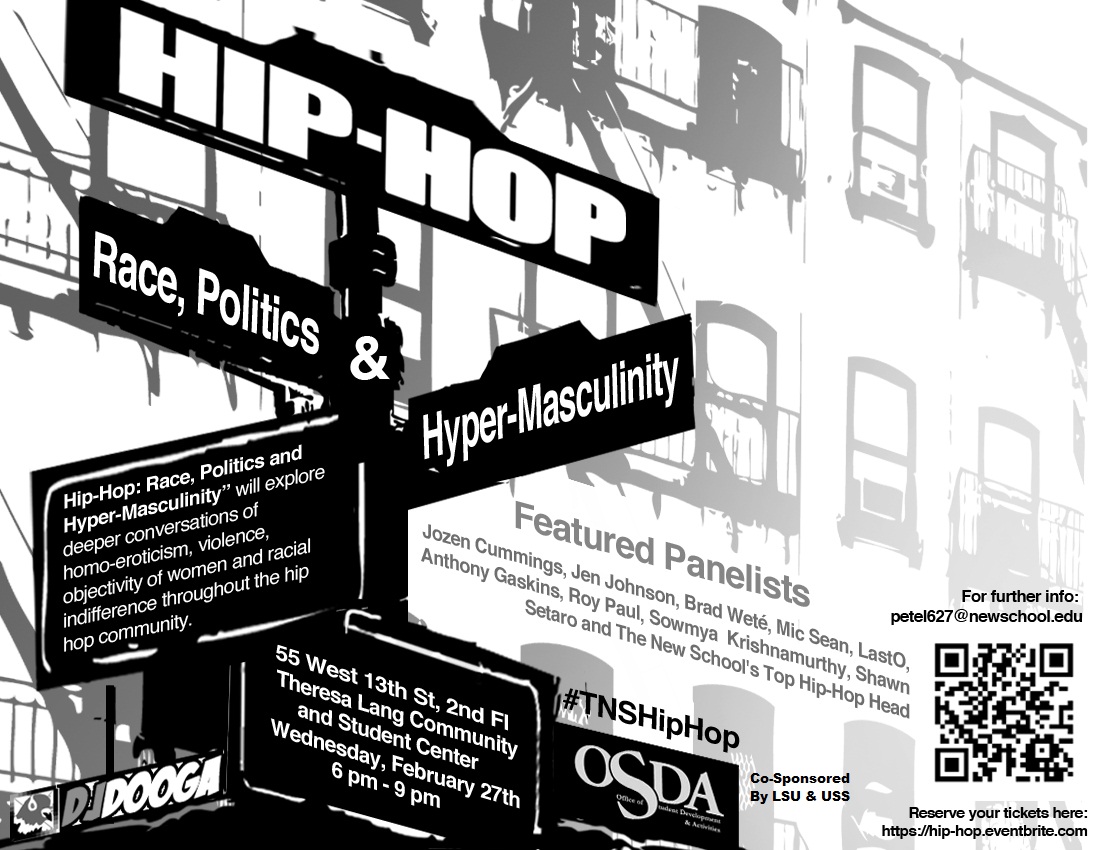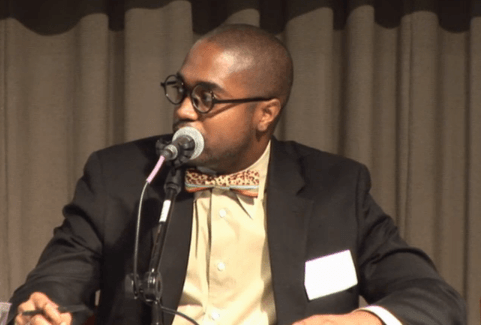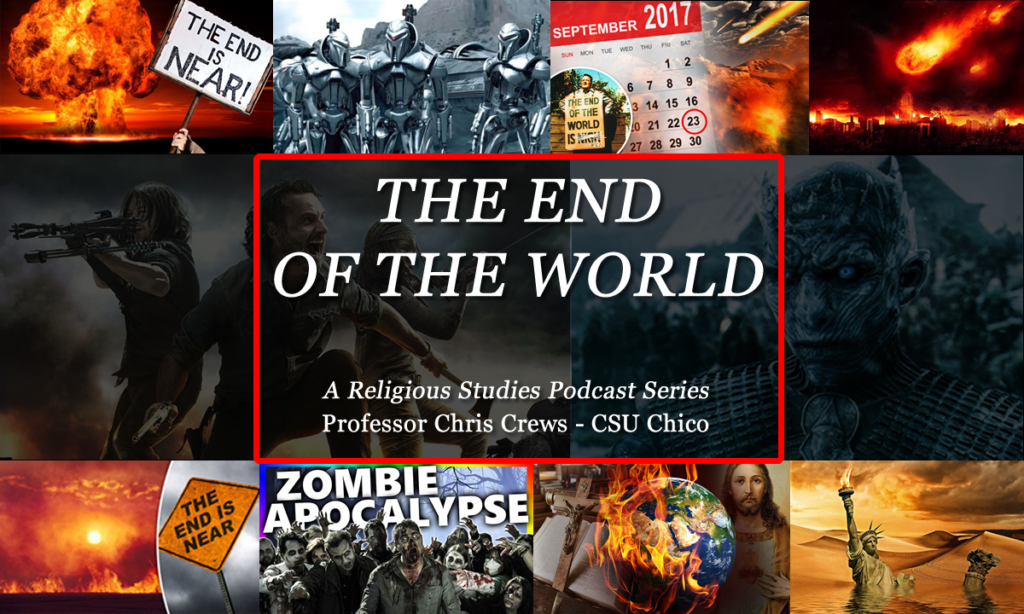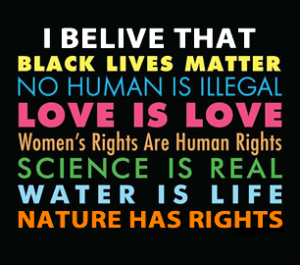Hip Hop Politics at The New School
 For those who missed it, there was an excellent event recently at The New School called Hip-Hop: Race, Politics, and Hyper-Masculinity that was organized by some former and current New School folks, and featured two panel discussions about hip-hop culture and politics, with a strong emphasis on race, gender and sexuality. A big shout to the organizers for putting on this excellent event, and I hope we see more of these in the future. Being a lifelong hip-hop fan, as well as thinking a lot about the politics of hip-hop, I found this panel both exciting and frustrating at different times and for different reasons.
For those who missed it, there was an excellent event recently at The New School called Hip-Hop: Race, Politics, and Hyper-Masculinity that was organized by some former and current New School folks, and featured two panel discussions about hip-hop culture and politics, with a strong emphasis on race, gender and sexuality. A big shout to the organizers for putting on this excellent event, and I hope we see more of these in the future. Being a lifelong hip-hop fan, as well as thinking a lot about the politics of hip-hop, I found this panel both exciting and frustrating at different times and for different reasons.
In case you missed the event, you can watch the livestream below. The event video is about 2.5 hours long. You can also check out #TNSHipHop for the twitter talk. So here are a few thoughts on the panel, in no particular order, about some of the issues discussed by panelists or raised in audience questions.
I liked the mix of panel discussion and multimedia clips, even if there were some minor video issues. The longer I am teaching and giving public presentations, especially to a younger generation of students, I find the back and forth engagement can make for a more lively discussion. And in this case, I think having the hip-hop videos in context of the discussion made for a richer event. Or at least that was my reaction. I think this is especially important when doing cultural criticism, and especially dealing with pop culture and visual politics. There is something missing to be talking about a medium and message without also seeing it, so kudos to the organizers for this creative mix of formats. I wish more public events would follow their example.
One of the things that was a little disappointing was the fact that two male speakers, Shawn Setaro from Rap Genius in the first panel, and New York Post reporter Jozen Cummings in the second panel, seemed oblivious to their dominance within the conversation, leaving much less time and space for the other panelists to speak. This was a bit perplexing (and ironic) for two panels discussing masculinity, a topic panelist Sowmya Krishnamurthy raised briefly in regard to her experience as a woman within the music/entertainment industry.
Perhaps it was just me, but I was especially surprised by Cummings, who came off at time like an apologist for hip-hop misogyny and apolitical industry whitewashing–literally and figuratively–of hip-hop. But given some of his other writings on women–he’s made a name for himself as a bachelor who writes about dating for the NY media–perhaps it’s not entirely surprising. Here’s a comment from one of his posts about women and dating:
Of course, the other reason I don’t like to take a woman out to eat on a first date is the same reason a lot of men have a problem with it. What has any woman done to deserve to eat on my dime? As I just said, going out to eat with a woman is something like sex, and if we’re not going to have sex on the first date, we’re damn sure not going out to eat on the first date.
Really, dude? After listening to some of his comments about gender and politics–defending Lil Wayne on Emmett Till being among them–I started to wonder why he was a panelist, especially given the topic of the evening. (For those unfamiliar with the Lil Wayne-Emmett Till controversy, see here) Fortunately Krishnamurthy did raise the issue of sexualization and objectification of women in the industry and pop culture more generally, and importantly reminded us that this issue is, as the saying goes, ‘bigger than hip hop.’
 Political Commentator Roy Paul, another panelists and New School alum (media studies if I remember correctly), was one of the panel highlights for me, and I wish he would have had more time to interject his humor and political insights. And man, his bowtie was AMAZING!
Political Commentator Roy Paul, another panelists and New School alum (media studies if I remember correctly), was one of the panel highlights for me, and I wish he would have had more time to interject his humor and political insights. And man, his bowtie was AMAZING!
He also made an important point about how difficult it is within hip-hop culture today to talk about what it means to be a man or a woman (or any gender identity I would add), either because of the rampant homophobia or the limited set of personas depicted in hip-hop videos today. And as High End Agency Creative Director and panelist Mike Spence (aka Mic Sean) pointed out, the increasing social and political advancement of Black women in the US, as compared to the position of (especially young) Black men, has led to an attempt on the part of males to assert their dominance whenever possible to compensate for the perceived inferior status vis-a-vis women.
Finally, I was hoping that the talk would have a larger focus than just mainstream US hip-hop. But except for a short discussion about the role that hip-hop plays–or doesn’t play–as a cultural ambassador abroad, there was very little talk about the larger global context of hip hop music and cultural diffusion, and how this is changing what hip-hop is, something that I find particularly fascinating as a scholar of pop culture and a fan of hip-hop music from around the world, and not just in the US.
And to be sure, conscious hip-hop, as opposed to most of the garbage on the radio and internet that passes for “hip-hop” these days, still has problems with homophobia and sexualization and glorification of violence, but it would have been nice to have a more critical edge to some of the discussions, which often felt artificially depoliticized due to the limited examples of what I would consider real political hip-hop (excluding the usual invocation of folks like Mos Def or Stic.man). What about folks like Paris, MIA, Immortal Technique, Beastie Boys, Rebel Dias, Pharoahe Monch, Salt-n-Pepa, Queen Latifah, MC Lyte, Erykah Badu, Lauryn Hill, Fugees, etc… And what about “homo-hop” and the small but growing number of queer rappers of color? From the talk you would think there are pretty much none except panelist and rapper LastO, who just happened to be there. But performers like Tori Fixx and Me’Shell NdegéOcello have been doing this for a while (mid-90’s for some).
But these issues aside, I think there were a lot of important issues raised and discussed between the panels and audience Q&A, and I found the discussion of the Harlem Shake viral madness sweeping the interwebs interesting, as there was a pretty wide range of takes on the video from the panelists and audience members, including one New School faculty who apparently teaches hip hop dance.
But perhaps most important in my mind is that we are even having these conversations, and they are happening at The New School, is exciting. As someone who is actively involved organizing around social justice issues on and off campus, the more of these events we can host the better. So kudos to the organizers and everyone who put this together, and let’s home there are more events like this in the months and years to come.
As mentioned before, here is the livestream of the event so you can watch and decide for yourself.
Until next time…remember, it’s bigger than hip hop, hip hop!
###


